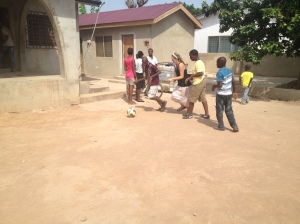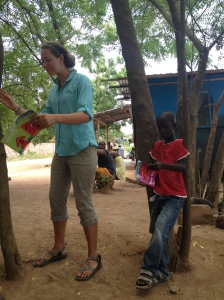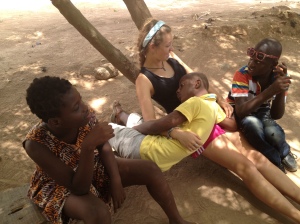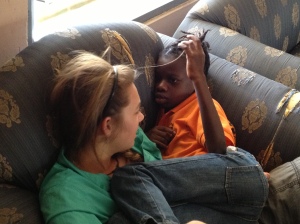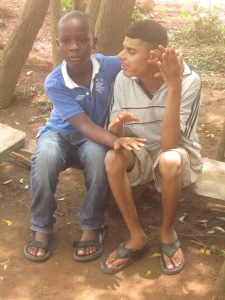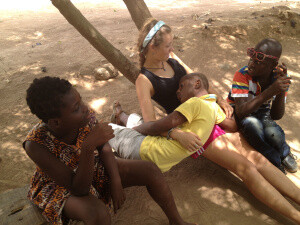
The following post is from Anna Brodmerkel, a 2014 Global Gap Year Fellow. UNC’s Global Gap Year Fellowship is housed in and staffed by the Campus Y. Find out more about the fellowship on our GGYF Facebook page!
Honesty. Pure honesty. That’s hard.
During my entire gap year blog, I’ve been honest… but only to an extent. I’ve chosen to write about the best moments, and tend to gloss over the not-so-nice parts. I would rather put more energy into optimism and idealism, than sound the slightest bit pessimistic or unhappy. I am eternally grateful for the fellowship and the unique opportunity UNC Chapel Hill and God has blessed me with this year, and would never want it to appear otherwise. Therefore, I suck up the hardships and realize that life can’t always be sunshiney and easy. There’s also the part of me that doesn’t want to worry anyone. I cannot have people constantly worrying about me while I’m abroad, and I will not accept any pity for whatever unfortunate circumstance I may have encountered. It’s just not who I am, which I don’t feel like is a bad thing.
General Thoughts:
1. Africa is not one country. Ghana is a country in Africa, and very different from other countries/regions. I’m not sure how many people actually understand this concept.
2. It’s hot (approx. 90-100 F, 36 C), but I appreciate that the weather is dependable, unlike crazy NC weather. It helps if people don’t complain.
3. Bucket showers aren’t that bad- they conserve water, and cold water feels good after sweating all day.
4. Hand washing laundry isn’t ideal, but a handy and empowering skill to learn. I suggest everyone who wishes to travel learn to hand wash well at some point.
5. Ghanaians usually eat hot, heavy, starchy meals. Delicious fruits are readily available, but most people only occasionally eat them as snacks. I definitely enjoyed some of the food (fried plantains!), but usually ended up giving half of my meals to the children to finish.
6. Yams just aren’t my thing. Rice was always a safe food I knew I would eat and usually ordered, but I won’t be eating much while in the US. “Red Red,” black eyed peas (“beans”) mixed in spices and tomato sauce with fried plantain, became my favorite dish!
7. Women definitely play a more domestic family role, but I respect them for it. Their job of cooking, cleaning, washing, and taking care of children, in addition to a separate job has to be more difficult than just a 9-5 job a man might have. Men work extremely hard, but are not required or expected to do domestic chores of women (generally speaking). Although women and men are still not on equal terms, I feel as if Ghanaian women do our sex justice in their domestic roles.
8. Young children calling you “Obruni,” or rather shouting it at you, seems cute at first, but it gets old fast. I don’t feel like foreigners should encourage young children to call people by the color of their skin. It’s weird and uncomfortable when adults do it, but how can we (foreigners) be mad when we smile and cheerily wave at them when they are children. I’m not telling people to be rude to little children, as they don’t see many light skinned people, but just to recognize the impression their reaction will leave on the children. Just think, please.
9. White and black look different, yes. It’s true. I just do not enjoy constantly being grabbed or hissed at. (Ghanaians hiss to get anyone’s attention-no matter the color. Men ask female foreigners: “Can I be your friend?” “Do you have a boyfriend?” “Will you marry me?” or rather tell them, “I will marry you.” I understand the “why” behind this, but it still made me extremely uncomfortable, although I never felt unsafe by it.
10. Ghanaians are the most friendly people and make it easy to travel within the country. They will lead you wherever you need to go, instead of maybe pointing you in the right direction and leaving you to your own devices such as “Westerners” would most likely do. They make time for you. It’s great! They will most likely try to cheat you out of money, but that happens in any country, so I don’t blame them for that.
11. “Ghana time” is a real thing. Nothing, absolutely nothing, is on a real timetable. Schedules seem to be nonexistent, and things never seem to get finished. Most things are just half done, but that’s part of being a developing nation. Ghana is definitely progressing and more “westernized” than one would think in the southern regions, but the country still has a long way to go. Slowly, but surely.
12. Some things about our culture shocks them, just as the reverse happens to us. My life runs at a much faster pace at home, but I think there’s something to take away from a more relaxed pace. Keeping an open mind and having no expectations is the best way to enter a new country. Fact.
Thoughts on YAP Ghana:
1. I had few, very simple expectations upon arriving. For instance, there would be trained teachers in special education, and I would learn from them. Wrong. I taught my own class when I had absolutely no experience teaching, even to children without learning disabilities. I felt like the volunteers had extra expectations not originally expressed by the staff, which caused some tension.
2. I was expected to come up with daily lesson plans for children on all different levels. This was not so difficult, but trying to keep all students on task felt impossible, even with another teacher. There is no set curriculum for these children, and most are on different levels. Each child required individual attention at all times, and I am only one person, making it especially difficult to keep all students on task.
3. Most of the students had major behavioral issues. Half of my time was usually spent trying to keep them from running out of class. This was exhausting.
4. I definitely saw progress over the term for most of my students, and that made all my efforts worth it.
5. The students’ smiles and hugs were the best. Just holding their hands on walks or dancing on the porch could make my entire day.
6. Afternoon activities usually had more success than indoor class time. The kids always enjoyed music time and most participated in singing multiple songs. Football (soccer) was their favorite sport, and we played often. It was the best seeing their faces after they scored a goal!
7. I think the children at YAP should have an actual classroom. It’s important the students feel like their classroom is a place of learning, not a place of relaxing, eating, and perhaps some learning.
8. The students should all have their eyesight and hearing tested, professionally. They should all also be tested for specific learning disabilities.
9. Students in Ghana are “caned,” as in hit, for discipline. Disability students are no exception.
10. I’m not sure what roles adults with disabilities play in society. It’s very different from the US, where there are many opportunities and laws against discrimination. It makes me sad to think of what could happen to these children as they grow into adults, but at least they have YAP for now.
11. Living and working in the same place is not ideal. Living at the school made life easier in many ways, but I felt like I lost motivation and creativity throughout the term. I hate to say that, but if I’m being honest….
12. YAP Ghana taught me more than I could have possibly asked for, and made me a much more flexible and adaptable individual. I didn’t necessarily agree with all the decisions made at the school, but I survived, and I’m stronger for it. I seriously considered leaving after my first two weeks, but I’m glad I stuck it out for the children.
13. YAP became my home and family. It’s strange to think I’ll probably never see any of the students or staff again. I miss them.
This blog post was special, because I tried my best to be completely honest about my experience in Ghana. I appreciate all that I learned in Ghana, all the people who helped me along the way, all the children who let me be their friend, auntie, and teacher, and the opportunity to volunteer with YAP Ghana. With that said, I hope I did not offend anyone or step on any toes. Like I said before, pure honesty is hard, but y’all deserve to know the truth, unfiltered (mostly). I would definitely encourage anyone to volunteer/travel in Ghana, and if anyone has questions I would be happy to answer them.

